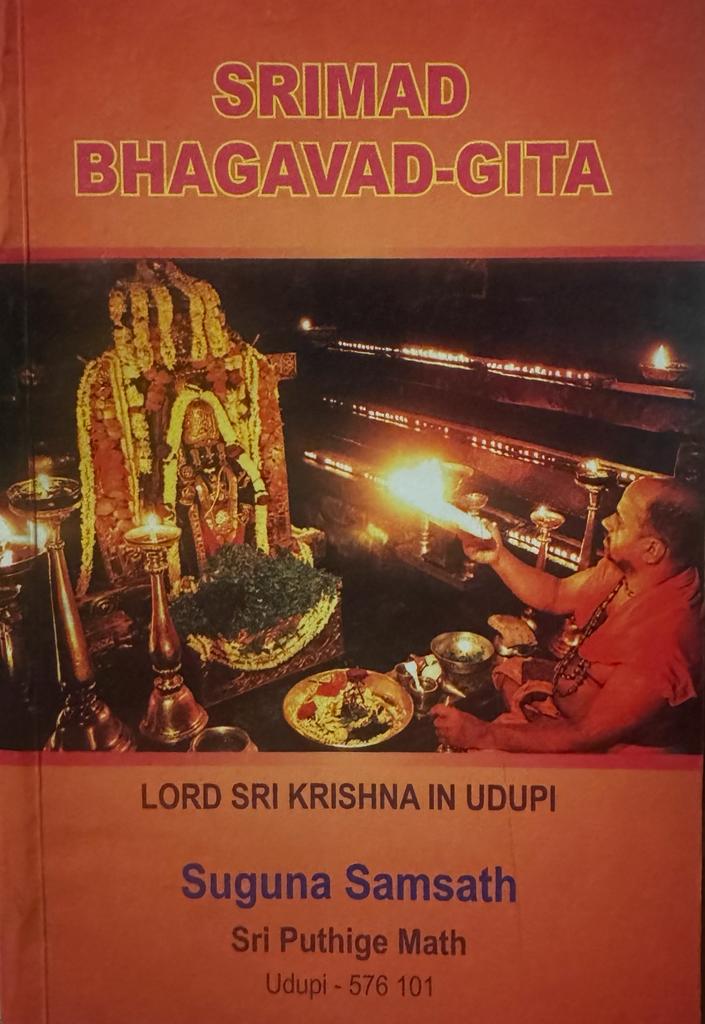हरि सर्वोत्तम । वायु जीवोत्तम । श्री गुरुभ्यो नमः ।
*NOTE: Choose desired output script using Aksharamukha (screen top-right) to see Vedaswara.

Bhagavad Gita 17: Śraddhātraya Vibhāga Yoga
हरि सर्वोत्तम । वायु जीवोत्तम । श्री गुरुभ्यो नमः ।
अथ सप्तदशोऽध्यायः
श्रद्धात्रयविभागयोगः
अर्जुन उवाच
ये शास्त्रविधिमुत्सृज्य यजन्ते श्रद्धयान्विताः ।
तेषां निष्ठा तु का कृष्ण सत्त्वमाहो रजस्तमः ॥ १७।१ ॥
Arjuna said –
O Kṛṣṇa! There are those who perform sacrifices with devotion, but casting aside spiritual injunctions – what is their position? Is it Sātvic, Rājasic or Tāmasic?
श्रीभगवानुवाच
त्रिविधा भवति श्रद्धा देहिनां सा स्वभावजा ।
सात्त्विकी राजसी चैव तामसी चेति तां शृणु ॥ १७।२ ॥
Śrī Bhagavān said –
Threefold is the innate faith of the Souls – Sātvic, Rājasic and Tāmasic – according to their intrinsic natures. Hear from Me now about this three-fold faith.
सत्त्वानुरूपा सर्वस्य श्रद्धा भवति भारत ।
श्रद्धामयोऽयं पुरुषो यो यच्छ्रद्धः स एव सः ॥ १७।३ ॥
O Bhārata, the faith (shraddha) of each Jīva is in accordance with his Jīva – essence. This Jīva is constituted of faith, so what his faith is, that verily he is in his innate nature.
यजन्ते सात्त्विका देवान्यक्षरक्षांसि राजसाः ।
प्रेतान्भूतगणांश्चान्ये यजन्ते तामसा जनाः ॥ १७।४ ॥
Sātvic souls worship gods (Devas); Rājasas, Yakṣas and Rākṣasas; Tāmasas, ghosts and demons.
अशास्त्रविहितं घोरं तप्यन्ते ये तपो जनाः ।
दम्भाहङ्कारसंयुक्ताः कामरागबलान्विताः ॥ १७।५ ॥
कर्षयन्तः शरीरस्थं भूतग्राममचेतसः ।
मां चैवान्तःशरीरस्थं तान्विद्ध्यासुरनिश्चयान् ॥ १७।६ ॥
There are people who perform severe austerities not ordained by scriptures, possessed with vanity and pride, and impelled by lust, passion and power – know these unintelligent people who belittle all the deities i.e., presiding over the 25 tattvas in the body and also Me seated as the Ruler in the inner body, to be of demoniacal persuasion.
आहारस्त्वपि सर्वस्य त्रिविधो भवति प्रियः ।
यज्ञस्तपस्तथा दानं तेषां भेदमिमं शृणु ॥ १७।७ ॥
Even the food liked by these people is in three different ways; so also the sacrifices, austerities and charities. Hear now the distinction amongst them.
आयुःसत्त्वबलारोग्यसुखप्रीतिविवर्धनाः ।
रस्याः स्निग्धाः स्थिरा हृद्या आहाराः सात्त्विकप्रियाः ॥ १७।८ ॥
The foods favourite to the Sātvic souls are those that promote life, vitality, energy, health, happiness and cheerfulness, and that are delicious, soft, substantial and agreeable.
कट्वम्ललवणात्युष्णतीक्ष्णरूक्षविदाहिनः ।
आहारा राजसस्येष्टा दुःखशोकामयप्रदाः ॥ १७।९ ॥
The foods that are dear to Rājasic souls are bitter, sour, saltish, over-hot, astringent and dry, producing bodily pain, and suffering and cause grief and disease.
यातयामं गतरसं पूति पर्युषितं च यत् ।
उच्छिष्टमपि चामेध्यं भोजनं तामसप्रियम् ॥ १७।१० ॥
The food that is dear to Tāmasic souls is what is stale, what is left to remain for over a Yama (3 hours), has lost its flavour, stinking, the remnant of meals, and unclean.
अफलाङ्क्षिभिर्यज्ञो विधिदृष्टो य इज्यते ।
यष्टव्यमेवेति मनः समाधाय स सात्त्विकः ॥ १७।११ ॥
The sacrifice which is performed by men as enjoined in scriptures without desiring any fruit thereof, having made up the mind that performance of sacrifices is a duty, is Sātvic.
अभिसन्धाय तु फलं दम्भार्थमपि चैव यत् ।
इज्यते भरतश्रेष्ठ तं यज्ञं विद्धि राजसम् ॥ १७।१२ ॥
That sacrifice performed in expectation of some reward and also for self-glorification (ostentation), O foremost of Bharatas, is Rājasic.
विधिहीनमसृष्टान्नं मन्त्रहीनमदक्षिणम् ।
श्रद्धाविरहितं यज्ञं तामसं परिचक्षते ॥ १७।१३ ॥
That sacrifice performed without the authority of the scriptual ordinances without distribution of food, without chanting Mantras and without any payments of Dakṣiṇa to the Gurus and without any faith is said to be Tāmasic.
देवद्विजगुरुप्राज्ञपूजनं शौचमार्जवम् ।
ब्रह्मचर्यमहिंसा च शारीरं तप उच्यते ॥ १७।१४ ॥
Worship of the deities, brahmins preceptor and the wise, purity (both physical and mental), uprightness, celibacy (continence) and harmlessness are called the austerity (Tapas of the body).
अनुद्वेगकरं वाक्यं सत्यं प्रियहितं च यत् ।
स्वाध्यायाभ्यसनं चैव वाङ्मयं तप उच्यते ॥ १७।१५ ॥
Speech giving no offence to others, truthful, pleasant and beneficial and constant study of the Vedas are called the penance of speech.
मनः प्रसादः सौम्यत्वं मौनमात्मविनिग्रहः ।
भावसंशुद्धिरित्येतत्तपो मानसमुच्यते ॥ १७।१६ ॥
Tranquility of mind, gentleness, silence, concentration on God and confining oneself to pure thoughts – these are called mental penance.
श्रद्धया परया तप्तं तपस्तत्त्रिविधं नरैः ।
अफलाकाङ्क्षिभिर्युक्तैः सात्त्विकं परिचक्षते ॥ १७।१७ ॥
This three-fold penance practised with utmost faith by men without any attachment to the fruits thereof and in a spirit of dedication to the Lord is called Sātvic penance.
सत्कारमानपूजार्थं तपो दम्भेन चैव यत् ।
क्रियते तदिह प्रोक्तं राजसं चलमध्रुवम् ॥ १७।१८ ॥
That austerity practised with the object of gaining respect, praise, reverence and for ostentation is declared Rājasic and is unstable and unsettled in the effects.
मूढग्राहेणात्मनो यत्पीडया क्रियते तपः ।
परस्योत्सादनार्थं वा तत्तामसमुदाहृतम् ॥ १७।१९ ॥
That authority practised with foolish obstinacy or self-torment or for destroying another is said to be Tāmasic.
दातव्यमिति यद्दानं दीयतेऽनुपकारिणे ।
देशे काले च पात्रे च तद्दानं सात्त्विकं स्मृतम् ॥ १७।२० ॥
That gift given with the faith that charity should be made and that to one from whom no return is expected and that too given in a right place and time and to a worthy recipient is said to be Sātvic.
यत्तु प्रत्युपकारार्थं फलमुद्दिश्य वा पुनः ।
दीयते च परिक्लिष्टं तद्दानं राजसं स्मृतम् ॥ १७।२१ ॥
That gift made out of ill-gotten wealth, with the hope of getting a return is said to be Rājasic.
अदेशकाले यद्दानमपात्रेभ्यश्च दीयते ।
असत्कृतमवज्ञातं तत्तामसमुदाहृतम् ॥ १७।२२ ॥
That giving away in an improper place and time to unworthy recipients without courtesy and with contempt is said to be Tāmasic.
ऒंतत्सदिति निर्देशो ब्रह्मणस्त्रिविधः स्मृतः ।
ब्राह्मणास्तेन वेदाश्च यज्ञाश्च विहिताः पुरा ॥ १७।२३ ॥
“AUM, Tat, Sat” this triad is considered to be the name of the supreme God – “AUM” because it means He who has entered with the universe at the time of creation and into Whom the world is woven; “Tat” because He has to be understood only through Vedas and not by mere senses or inference; “Sat” because He is perfect in all excellent qualities and devoid of all defects.
तस्मादोमित्युदाहृत्य यज्ञदानतपःक्रियाः ।
प्रवर्तन्ते विधानोक्ताः सततं ब्रह्मवादिनाम् ॥ १७।२४ ॥
Therefore, with the utterance of the syllable “AUM” which is a name of God, acts of sacrifice, charity and austerity as prescribed in scriptures are always commenced by the seers of God.
तदित्यनभिसन्धाय फलं यज्ञतपःक्रियाः ।
दानक्रियाश्च विविधाः क्रियन्ते मोक्षकाङ्क्षिभिः ॥ १७।२५ ॥
With a view to acquiring the grace of “Tat” who is Brahman all pervading, the various acts of sacrifice, austerity and charity are performed without any desire for rewards (like even Svarga) by the seers of God, desirous of liberation, Mokṣa.
सद्भावे साधुभावे च सदित्येतत्प्रयुज्यते ।
प्रशस्ते कर्मणि तथा सच्छब्दः पार्थ युज्यते ॥ १७।२६ ॥
O Pārtha, the term “Sat” is employed in the sense of reality and in that of being good natured. It is also used in the sense of auspicious and praise-worthy acts.
यज्ञे तपसि दाने च स्थितिः सदिति चोच्यते ।
कर्म चैव तदर्थीयं सदित्येवाभिधीयते ॥ १७।२७ ॥
“Sat” denotes sacrifices, austerities and gifts – Karma performed with the firm conviction that the Lord alone bestows blessing on the man by His presence in those acts. It also means that acts are to be performed as duties to God (as intended for God).
अश्रद्धया हुतं दत्तं तपस्तप्तं कृतं च यत् ।
असदित्युच्यते पार्थ न च तत्प्रेत्य नो इह ॥ १७।२८ ॥
O Arjuna, whatever is offered into the fire without faith, though strictly done according to scriptural injunctions or given in charity, performed as penance or any other deeds would be called “Asat”. It will not lead to any good result, either here or hereafter.
ॐ तत्सदिति श्रीमद्भगवद्गीतासूपनिषत्सु
ब्रह्मविद्यायां योगशास्त्रे श्रीकृष्णार्जुनसंवादे
श्रद्धात्रयविभागयोगो नाम सप्तदशोऽध्यायः ॥ १७॥
Thus ends the Seventeeth Chapter of the Upanisads of the Bhagavad Gīta entitled “Śraddhātraya Vibhāga Yoga”, the Yoga of Division of Three-fold Faith.
Reference: Srimad Bhagavad Gita pocket book published by Suguna Samsath with English translation by Shri Bannanje Govindacharya (Received with blessings from HH Shri Shri Sugunendra Tirtha Swamiji of Puttige Matha in Austin, TX, Nov 1997)
Transliterated by Krishna Rao Vijayanagar and Raghunath Rao
“Do your Best … and leave the Rest … “
॥ सर्वं श्री कृष्णार्पणं अस्तु ॥


